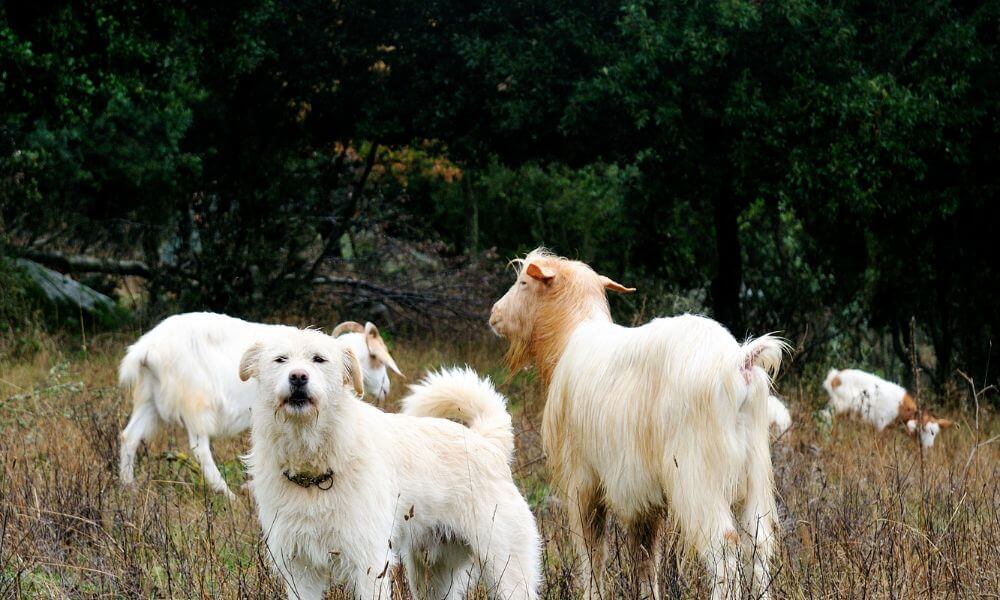I was enjoying breakfast in the garden the other day with a glass of fresh goat’s milk when my dog ran over and bumped into the table, spilling it all over the floor.
I’m used to these kinds of antics from him, but he instantly started licking up the milk off the floor.
My first reaction was to worry that it wasn’t good for him, so I led him away from it until I could answer the question for myself.
I did some research to find out before this happened again.
So, can dogs drink goat’s milk?
Yes, goat’s milk is entirely safe for dogs and even comes highly recommended as very healthy. It is loaded with probiotics that support healthy digestion for your dog, increasing the number of healthy gut bacteria. Allergies are not, however, uncommon, so you should still remain vigilant and careful.
Milk is a tough one to discuss in very general terms, as lactose intolerance and allergies are very common among species.
After all, milk is primarily meant for weaning baby animals, and there are no species in the wild that continue to drink it after a young age.
That said, it is rich in benefits for your dog if fed in the right way, so let’s look into that.

Is too much goat’s milk bad for dogs?
Well, by definition, yes, “too much” is bad.
Too much of anything would be bad.
Any one thing in your dog’s diet, especially something like milk that will likely constitute a treat, should only be fed in moderation.
Equally, your dog may be lactose intolerant, in which case no milk will be okay for it.
That said, goat’s milk contains high amounts of calcium, which promotes bone strength, muscle strength, and helps in the process of blood clotting which will prevent severe bleeding.
Goat’s milk is also rich in a number of B vitamins which support healthy metabolism and digestion.
Digestive issues are not uncommon in dogs, so goat’s milk is really helpful in that regard.
B vitamins also help regulate hormones, which can have a whole host of benefits including behavioral.
A vitamins present in milk help maintain eye health and maintain cell function, especially around vital organs, which has a huge effect on overall health.
The protein present serves a similar function, providing amino acids necessary for the whole body.
So, goat’s milk is healthy for dogs, and it will only be overfeeding it to them that causes problems.
How much your dog should drink will depend on its size.
For smaller dogs under 20 pounds, 2 ounces of goat’s milk per day would be plenty.
For between 20 and 40 pounds, up to 4 ounces (less on the lower end of the spectrum).
For dogs between 50-80 pounds, they could enjoy as much as 8 ounces a day.
Again, be careful and make sure to carefully monitor your dog’s reaction when you give it goat’s milk.
| Rekated Posts |
|---|
What milk can dogs drink?
So, goat’s milk is very safe for dogs.
Cow’s milk is a little different and, while still safe, should be fed in much greater moderation.
A few tablespoons of cow’s milk here and there would make a great treat for your dog.
You should probably at least start off with skimmed milk for your dog, whatever kind you are giving it, whether goat’s or cow’s milk.
Full fat can be very easy to overindulge, especially for small dogs.
The protein can easily become too much.
So, start off with skimmed milk.
Plant-based milk, while high in many nutrients lacking in other milk, are very high in calories so you should be careful with feeding these to your dog.
Almond milk, for example, is a great treat but is higher in calories than cow’s or goat’s milk, so you’ll have to take the moderation even further.
Soy milk is also fine for dogs as it is contained in many dog foods.
However, soy allergies are not uncommon for dogs, so make sure your dog is not allergic first.
Does goat milk give dogs diarrhea?
For dogs who are lactose intolerant, feeding goat’s milk could certainly lead to diarrhea.
The reactions to dairy and lactose are actually adverse, and diarrhea indicates lactose intolerance.
Lactose intolerance is caused when an animal lacks the enzyme in its gut to break down the special sugar.
Without the enzyme, the lactose will travel through the gut undigested and cause discomfort and diarrhea.
It is more common in puppies, and you probably shouldn’t feed milk to puppies.
Wait until they’re older, and they’re more likely to enjoy the milk.
You can, of course, still try small amounts and see how your dog reacts.
Whether your puppy has an adverse reaction or not, you always need to give it in moderation to avoid trouble.
Is cheese bad for dogs?
Just like milk itself, cheese is generally fine as an occasional treat for your dog.
It won’t cause any immediate problems.
It probably will, however, develop a taste for it, and again its very easy to overfeed it.
Cheese is high in fat and can quickly lead to excessive weight gain.
Moderation is always the key.
So, in careful moderation, goat’s milk can make a great treat for your dog.
You must be careful to observe their health and behavior after they’ve drunk it, as allergies are highly common.
If your dog seems to react well to it, though, it will make a great treat for your dog, as will many different types of dairy products like cheese and even yogurt.
Be observant and attentive, and your dog could love goat’s milk.
